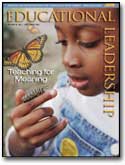What is your goal for the year? I'm not talking about a goal assigned to you or imposed by No Child Left Behind. I'm asking about the goal you have chosen for yourself.
Although you wouldn't know it from my infrequent workouts at the gym, I believe we all need to set goals and work toward achieving them. Goals give us focus, and our progress in meeting them provides us with instant feedback. Without focusing our efforts, we are less likely to succeed. Indeed, without goals, how can we know whether or not we have succeeded?
Educators' goals are typically tied to student success. We want a greater percentage of students to pass; we want to improve student attendance; we want students doing better in X, Y, or Z (or, more likely, in X, Y, and Z). Sometimes our goals are professionally oriented: We want to improve this pedagogical technique, we want to develop that curriculum, or we want to create a new professional development plan. It's hard to argue with these kinds of goals.
But as important as professional goals are, they don't address who we are as people. Goals that focus only on student progress, pedagogy, and curriculum ignore the way we function and grow and the way we work with and lead others. Yet these factors are crucial to our success and to the success of those we work with.
We need to set personal/professional goals. These are different from purely personal goals (losing weight or learning how to play the piano) and different from purely professional goals (writing curriculum or raising test scores). Personal/professional goals focus on the effect that such factors as personality, leadership style, and balance have on our performance at work.
But how do you decide on a goal? I went through a 360 evaluation, a performance assessment based entirely on the perceptions of the 30-plus people who work with me. It was both affirming and humbling. The process forced me to come to grips with who I am as a person and how that affects who I am as a professional. I learned, for example, that at times I seem too goal-oriented and focused, and I need to do a better job of listening to others. (What?) As a result, I set personal/professional goals to address these areas.
Not everyone has to set a goal this way. During an inservice session this August, I talked with faculty members about setting their own goals. I explained that although these goals would remain private, they had to relate to teachers' effectiveness at work. At our next faculty meeting, each teacher wrote his or her goal on a piece of paper and sealed it in an envelope labeled with his or her name. We then placed all our envelopes in a box (mine included) and ceremoniously taped it shut. After we finished, I announced that in May—just before the teachers' end-of-year professional growth conferences—I would return their unopened envelopes to them. At each teacher's final conference, I would ask whether or not the teacher had succeeded in attaining his or her goal, and whether I could help him or her reach it in any way. I also emphasized that sharing any information about the goal would be entirely up to the teacher.
Setting the goal is only the first step, of course, and monitoring teachers' progress on achieving their private goals will not be easy. Nevertheless, throughout the year I plan to periodically remind faculty members about their personal/professional goals, asking such questions as, “How do you think you're doing on your goal?” and “If someone knew your goal, what might he or she say about your progress?” Supporting teachers' progress in achieving their personal/professional goals fosters a climate of collaboration and collegiality. As a result, everyone in the building benefits.
Not every goal will be achieved; I know that. But I also know that the goal-setting process alone is beneficial. We all gain when we stop to reflect on our interactions with others and consider the influence those interactions have on our performance. In a future column, I'll share some of what I heard from my teachers as they reflected on their progress, and I'll also share a bit about how well I achieved my own personal/professional goals. Now it's time for you to set your own goal—where's that envelope?

